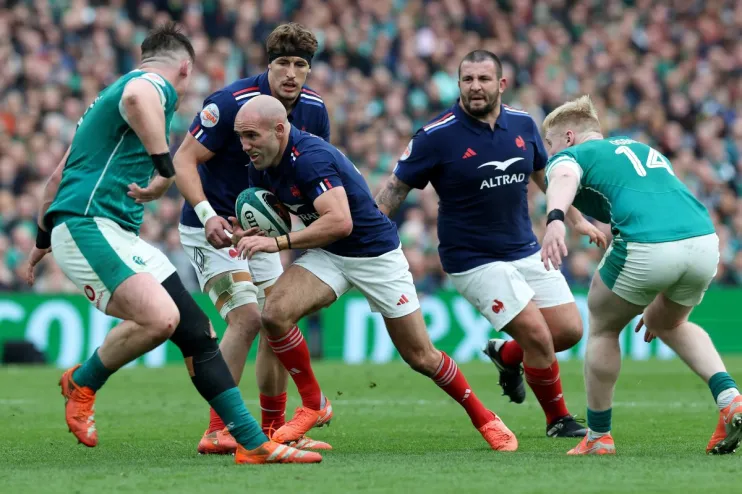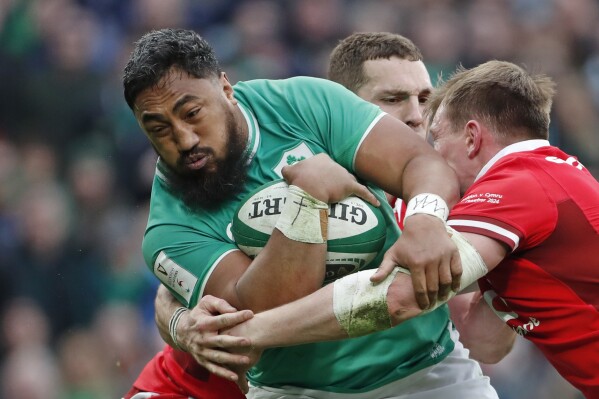Ireland will begin their 2026 Six Nations campaign with a first-ever Thursday night fixture in France.
Andy Farrell’s side, who finished third in the table in spring, will take on champions France on Thursday, 5 February with a 8.10pm Irish time kick-off. The announcement has already sparked significant interest among rugby enthusiasts, with Twin Casino’s sports betting platform reporting a surge in early outright market activity, offering Ireland at 3/1 to reclaim the title they last won in 2024.
The switch was made to avoid a clash with the opening ceremony of the Winter Olympics, which takes place in Milan the following day.
The Six Nations did not immediately confirm the venue for the game, although Stade de France in Paris is presumed to be the location for the high-profile opener.
Major Calendar Shake-up
Meanwhile, in another new development, there will be only one ‘down week’ in the tournament, as opposed to the usual two breaks.
It will take place after round three.
Originally announced in 2023, the removal of one break week is to help the alignment of the new global rugby calendar, which also sees the Women’s Six Nations pushed back three weeks, starting in early April.
“This represents a significant shift in how the Six Nations will be structured,” explained former Ireland international Shane Horgan. “The tournament has traditionally been spread across seven weeks with two down periods, but now we’re looking at a more condensed format.”
The move to a single rest week has drawn mixed reactions from players and coaches. While it creates a more streamlined tournament, concerns have been raised about player welfare, particularly for those involved in both club and international rugby.
“The physical toll on players will be greater,” noted Ireland head coach Andy Farrell when asked about the change earlier this year. “Recovery time between games is crucial at this level, and with one less week to recuperate, squad depth becomes even more important.”
Ireland’s Campaign Structure
Ireland’s second game is at home to Italy on Saturday, 14 February and the 2023 and 2024 winners will be away to England in round three on 21 February.
Following the break, Ireland host Wales on Friday, 6 March with a 8.10pm kick-off, while they round off their campaign with the first game of Super Saturday on 14 March against Scotland.
The final game of the Guinness Six Nations will see Les Bleus host England in what could potentially be a championship decider.
“In 2025, nearly 130 million fans were watching coverage of the Guinness Men’s Six Nations in home markets – a +6.30% increase compared to the previous year – and the set of fixtures for 2026 promises to keep fans hooked for five rounds of sporting entertainment,” said tournament organisers.
Thursday Night Innovation Divides Opinion
The decision to schedule a Six Nations match on a Thursday night for the first time in the tournament’s history has divided opinion among rugby traditionalists and those embracing innovation in the sport.
IRFU Chief Executive Kevin Potts expressed measured support for the move: “While we understand this is a departure from tradition, we recognize the need to be flexible in an increasingly crowded sporting calendar. Our priority is ensuring our team has the best possible preparation regardless of when the game is scheduled.”
For traveling Irish supporters, the Thursday evening kick-off presents significant logistical challenges. The IRFU has confirmed they are working with travel partners to arrange special packages, but many fans have taken to social media to express their frustration.
“It’s a nightmare for those of us who save all year to travel to away games,” said Dublin-based Ireland supporter Conor O’Sullivan. “Taking Friday off work is one thing, but now we’re talking about Thursday as well. It’s becoming a tournament that prioritizes TV audiences over match-going fans.”
Former Ireland captain Brian O’Driscoll offered a more positive perspective: “The game is evolving, and while a Thursday night fixture isn’t ideal for traveling supporters, it does create a prime-time TV slot that could attract new viewers to the sport. Sometimes these innovations, however uncomfortable initially, end up enhancing the tournament.”
Olympic Clash Forces Hand
The primary reason for the unusual scheduling is to avoid a direct clash with the opening ceremony of the 2026 Winter Olympics in Milan-Cortina, Italy on Friday, 6 February.
“Major sporting events increasingly need to coordinate their schedules,” explained Six Nations CEO Tom Harrison. “The Olympics is a global sporting spectacle, and it makes sense for us to avoid direct competition for viewers and media attention.”
Sources within the tournament organizing committee have confirmed that broadcast partners were influential in the decision, with the Thursday night slot expected to deliver strong viewership figures without the Olympic competition.
France, as defending champions following their 2025 triumph, will enter the fixture as favorites, though Ireland’s recent record against Les Bleus has been impressive, winning three of their last five meetings.
Compressed Format Creates New Challenges
The condensed tournament format, with just one break week instead of two, creates a new set of challenges for all competing nations.
Ireland’s schedule is particularly demanding, opening against France before hosting Italy, then traveling to face England at Twickenham before the sole rest week. They then face Wales on a Friday night before concluding against Scotland.
Former Ireland coach Eddie O’Sullivan believes squad management will be crucial: “Teams can no longer rotate as freely between matches. The reduced recovery time means you’re likely to see more injuries and potentially more conservative team selections. It’s another step toward prioritizing squad depth over your best XV.”
Ireland captain Caelan Doris, speaking at a commercial event last week, acknowledged the challenges: “It’s going to be physically taxing, no doubt about that. But we’ve developed great depth in Irish rugby over the last few years, and that’s going to be vital in a compressed tournament format.”
Growing Commercial Success
Despite the scheduling controversies, the Six Nations continues to grow as a commercial property. The tournament organizers highlighted the impressive viewership figures from 2025, with nearly 130 million fans watching coverage across home markets – a 6.30% increase compared to the previous year.
Sponsorship revenue has also hit record levels, with Guinness extending their title partnership through to 2030 in a deal reportedly worth over €50 million.
“The Six Nations remains the crown jewel of northern hemisphere rugby,” said commercial director Tom Hill. “While we’re always looking to innovate and grow, we’re careful to protect the unique character and traditions that make this tournament so special.”
As Ireland prepare for their historic Thursday night opener, fans will be hoping Andy Farrell’s men can overcome both the scheduling oddity and the formidable French challenge to start their campaign on a positive note.
“It’s going to be strange preparing for a Thursday night game to start a Six Nations,” admitted Ireland scrum coach John Fogarty. “But once the whistle blows, it’s still 80 minutes of rugby against a quality opposition. Our job is to ensure the players are ready regardless of the day of the week.”
2026 MEN’S SIX NATIONS FIXTURES
Round 1
France v Ireland – Thursday, 5 February (8.10pm)
Italy v Scotland – Saturday, 7 February (2.10pm)
England v Wales – Saturday, 7 February (4.40pm)
Round 2
Ireland v Italy – Saturday, 14 February (2.10pm)
Scotland v England – Saturday, 14 February (4.40pm)
Wales v France – Sunday, 15 Feburary (3.10pm)
Round 3
England v Ireland – Saturday, 21 February (2.10pm)
Wales v Scotland – Saturday, 21 February (4.40pm)
France v Italy – Sunday, 22 February (3.10pm)
Round 4
Ireland v Wales – Friday, 6 March (8.10pm)
Scotland v France – Saturday, 7 March (2.10pm)
Italy v England – Saturday, 7 March (4.40pm)
Round 5
Ireland v Scotland – Saturday, 14 March (2.10pm)
Wales v Italy – Saturday, 14 March (4.40pm)
France v England – Saturday, 14 March (8.10pm)
- Never Mind the Bayerns, Here’s the Bundesliga - September 9, 2025
- That Italian Job: Your 2026 Football Punt - September 8, 2025
- That Purple Light and Other NBA Guff - September 4, 2025
















